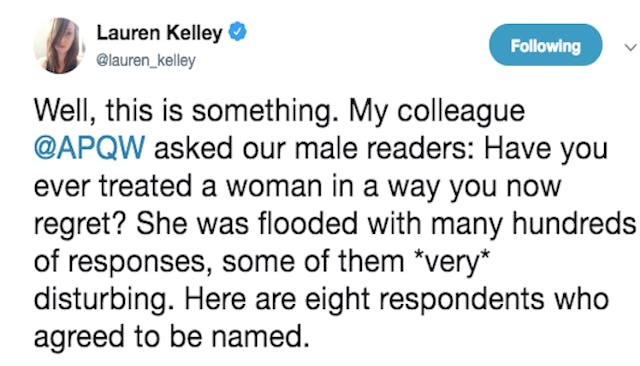Men Share Past Experiences Of Putting Women In Situations They Regret

Eight men are sharing harrowing stories of their own sexual misconduct
Last month, amid Dr. Christine Blasey Ford’s accusations against Brett Kavanaugh became public, The New York Times invited male readers to tell us about their own high school experiences and regrets — specifically surrounding putting young women in uncomfortable situations.
They were flooded with hundreds of responses almost immediately.
While the Times reports receiving stories where several men condemned the actions of Kavanaugh and claimed they had never committed any untoward or violent acts against women in high school, a majority of male responses were admissions of guilt.
Many submissions were anonymous, and, the Times notes, “deeply disturbing.” Multiple men admitted to participating in gang rapes. Other submissions were men admitting they partook in activities like un-snapping bras. The Times refused to publish anonymous submissions — eight men who responded agreed to be named.
Patrick Herron graduated high school in 1970, and was 15 at the time of his incident. He describes “going on a drive” with a girl from his neighborhood and two of his friends. The three young men threatened to abandon the girl on the side of the road and force her to walk home if she didn’t allow them to fondle her exposed breasts. “As a father of two millennial daughters and one millennial son, I would be horrified today if anything close to that ever occurred,” Herron says. “This is the first time I have ever spoken about it.”
Another man, Gene Biriniger, describes a neighborhood wrestling match back in 1971 when he was 16. He says he took advantage of the “chaos” and decided he could “get away with” groping the breast of a young woman he had a crush on. “I don’t know whether she ever knew who groped her, but she immediately extricated herself from the pile, clearly upset, and promptly left without saying a word,” Biringer says. “I have never forgotten the look on her face: she seemed at once hurt, disappointed, indignant, and bewildered.”
Lee Montgomery says he was 17 in the 1940s when he and a friend took a young girl on a drive and Montgomery whispered sexual innuendos and threats to her — with, he admitted, no intention of following through on any of it — until she was sufficiently terrified and ran to her house when they dropped her off. “I believe it is entirely possible for people to mature and be good citizens and to leave behind youthful bad behavior,” he says. “But to do so requires admitting to wrongdoing. If I were to see her today, I would apologize sincerely with no excuses.”
Another man included in the Times piece admitted to being complicit by standing around while his friends sexually coerced young girls, and he failed to intervene. All of the stories are heartwrenching and disturbing. All of them are stories so many women have experienced themselves as victims of sexual assault.
Perhaps the overarching theme through all of these stories — ranging from sexual misconduct to full-on assault — is that each of these men knew exactly what they were doing before they did it, and during. They all describe the power dynamics of the situation in the same way. And the young women they did these things didn’t have any power at all.
The author of the piece, Alicia P.Q. Wittmeyer, feels that the #MeToo movement and any positive results we may achieve as a society moving forward can’t happen without men speaking up and acknowledging their behavior.
While these men — by admitting their wrongdoing without any hint of defensiveness or victim-blaming — have helped steer the direction of the movement by starting a new dialogue, let’s not forget whose voices should always remain elevated first: those of victims and survivors everywhere.